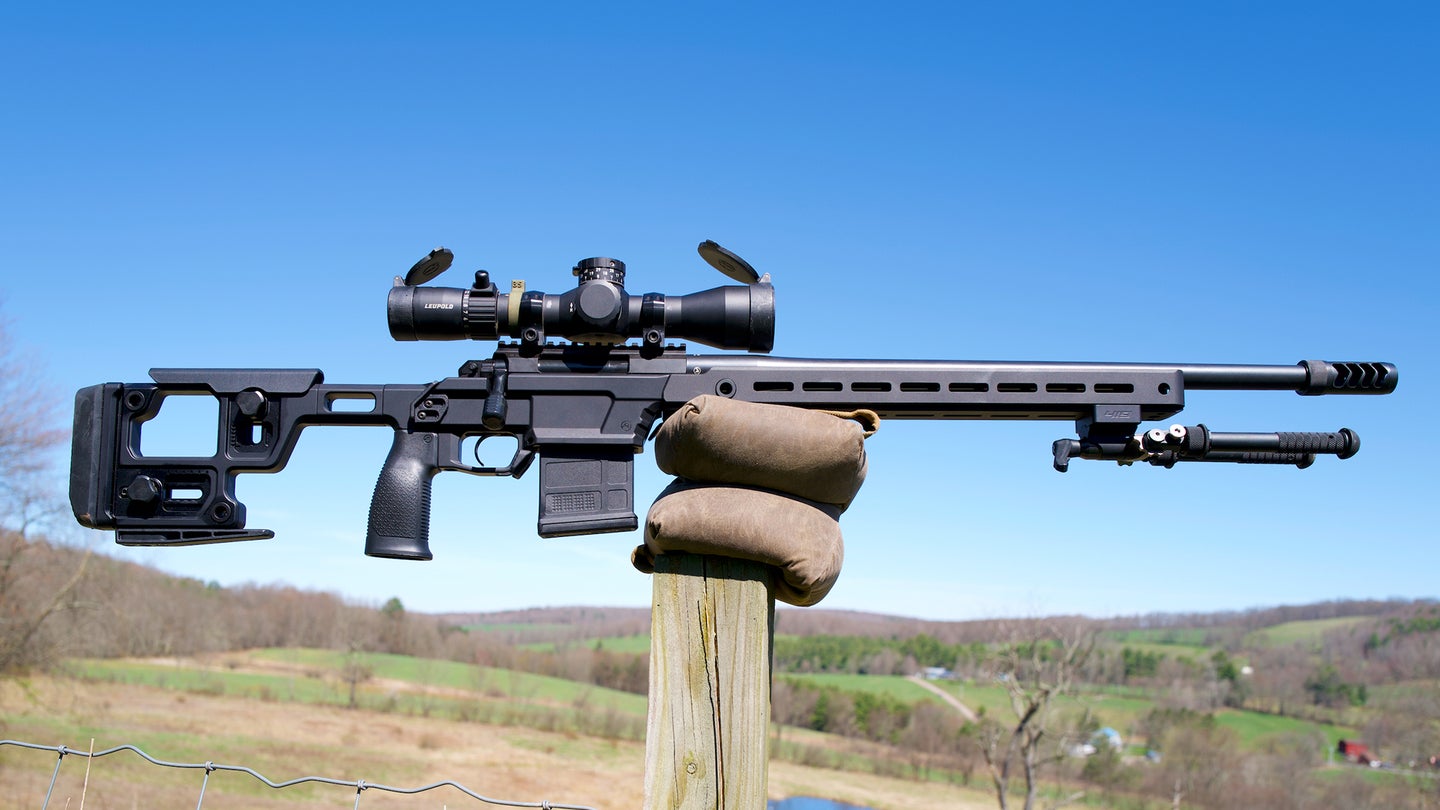Aero Precision Solus Competition Rifle Review

The Aero Precision Solus Competition is one of three new bolt-action rifles the company has released this year. Matthew Every
We may earn revenue from the products available on this page and participate in affiliate programs. Learn more ›
If you shoot AR-15s a lot, you may know about Aero Precision. The company is a staple for high-quality uppers, lowers, and other parts, plus fully-built AR-platform rifles. Their website is one of the easiest to navigate for specing out parts to build an AR, and recently, they’ve decided to take a similar approach with a completely novel bolt-action rifle—the Solus.
With the Solus, Aero is catering to builders by offering just the action, a barreled action, separate chassis systems, and stocks for sale. For those who care more about pulling triggers than turning torque wrenches, however, Aero also offers three complete Solus rifles that are ready to shoot out of the box: The Solus Hunter, The Solus Competition, and the Solus Bravo. F&S shooting editor Richard Mann recently evaluated the Solus Hunter, and it sounds like a fine rifle. But I wanted to see what Aero’s Solus Competition rifle could do. After about a week of testing, here’s what I discovered.
Aero Precision Solus Competition Specs
Aero Precision
Weight: 11.08 pounds
Barrel: 22-inch, Sendero profile, 1:8 twist threaded at 5/8×24
Action: Bolt action with interchangeable three-lug bolt head and 60-degree throw
Trigger: Trigger Tech adjustable single-stage
Capacity: 10+1 (AICS and AIAW compatible)
Finish: Anodized or Cerakote
Stock: Solus Competition Chassis
Chambering: 308 Winchester, 6.5 Creedmoor (tested), 6mm Creedmoor
Price: $2,210
Aero Precision Solus Competition Overview
Close-up looks at the Solus Competition’s safety and bolt, butt stock and grip, forend, and magazine. Matthew Every
As is the case with all Solus rifles, the action on the Competition model is machined from 416 stainless with an integral 20-MOA rail and integral recoil lug. It has a three-lug interchangeable bolt head with a 60-degree throw, dual ejectors, and a cock-on-lift design. It’s compatible with AICS and AIAW detachable box magazines and comes with an adjustable Trigger Tech single-stage trigger—which has become somewhat of a standard in many precision rifles today.
The Solus Competition ships with a honed and lapped Sendero-profile match-grade barrel with a muzzle threaded at 5/8×24. All of this sits in a solid aluminum chassis that will accept a bipod spigot, an optics bridge for things like nightvision or thermal, and standard AR-15-style grips.
The chassis has a fully adjustable stock and comes standard will little add-ons like a bag rider, an adjustable thumb rest for your shooting hand, and an adjustable ambidextrous magazine release. To top it off, the forend is machined with a full-length ARCA rail, MLOK slots, and QD sockets all over the place.
Heavier tends to be better in the PRS world, and the Solus Competition delivers at just over 11 pounds. The rifle ships with one 10-round Magpul AICS magazine and a thread protector instead of a brake. It also comes with a sub-MOA guarantee, but we’ll get to that in just a minute.
Solus Competition Rifle Test Results
The author tests the Solus Competition for precision from a bench. Matthew Every
Before testing, I set the rifle up in a way I would for a PRS match. I added a Leupold Mark 5 HD 3-18×44 and an Atlas bipod with an ARCA adapter. I also threaded on an Area 419 Hellfire muzzle brake which I felt matched up with the barrel nicely (and took virtually all recoil out of the gun).
On the range, I sighted the rifle in for 100 yards and fired multiple 5-shot groups with different factory ammo from the bench with a rear bag and bipod. I then chronographed and averaged velocities for multiple brands of factory ammo. I also wanted to get the rifle off the bench to see how it would perform during a match. I fired the Solus from various field positions and barricades, trying to score hits on steel at various distances.
From the bench, the rifle averaged 0.876 inches with four different loads, making good on Aero’s sub-MOA guarantee. (This was just how I shot on the day of the test. Look around on the Internet and you’ll find many accounts of sub-½-MOA precision from the Solus.) Here are the results of the precision test:
The Solus Competion does exactly what you want it to. It shot light’s-out, turning in sub-MOA groups with just about any brand of ammo I could feed it. I ran this gun hard to simulate how something like a hot barrel might affect accuracy during the sustained fire of a match, and there wasn’t an issue. Punching holes in paper with the Solus was like operating a drill press. I could almost predict exactly where the bullets were going before pulling the trigger.
The Solus is heavy, easy to control, and just kind of hangs on target once you get in the groove. I found the grip and thumb rest extremely comfortable and the safety right where you want it. The bolt is big enough to grab under stress, but not so big that it gets in the way. It lifts and cocks easily, and it is very smooth and fast to operate. At one point, I decided to run the rifle as fast as I could, and my neighbor thought I was shooting a semi-auto.
The stock on the Competition chassis is very easy to adjust with machined hardware for a variety of body types and scope heights. When you put your adjustments in place, they stay put. Some might knock the chassis for not having a folding stock, but I don’t think it’s a big deal. This is a rifle for shooting matches, not shoving in a backpack. (If it really bothers you, you can buy a Solus barreled action and put it into any Remington 700 footprint chassis you want.)
The only thing I found a little annoying about the Solus is that it spits empty casings right into the knuckles of your shooting hand. This probably has more to do with where my hand is when I work a bolt, and you might not have the same experience. Either way, it doesn’t really matter. You’ll be so happy with how you’re shooting, you won’t care about a bump on the knuckle.
Final Thoughts on the New Solus Competition
I’ve tested similar “production class” PRS rifles, and if I was going to buy one today, I would get this rifle. Are you going to hunt with it? Of course not. The Solus Competition is a straight-up race gun build for speed, recoil control, and precision. It’s made for having fun at the range and winning competitions. I wouldn’t compare it to guns like the Sig Cross or the Bergara MG Lite because it’s not trying to fit the role of an ultralight chassis gun. And I’m totally fine with that.
I prefer lightweight guns, and it’s amazing how light precision rifles have become. But sometimes I like to sit behind an artillery piece like the Solus Competition, experience little to no recoil, and watch bullets splash on steel through my scope.
But what’s really exciting about this rifle is the open-source nature of the Solus action. DIY rifle builders will most appreciate two things: It’s built with a Remington 700 footprint, and it accepts Savage Small Shank barrels with a barrel nut, making it compatible with a dizzying array of stocks and barrels. Best of all, Aero has loaded the action and the rifle with premium features for a relatively affordable price—something the company has always done well. It’s nice when smart people design rifles.
The post Aero Precision Solus Competition Rifle Review appeared first on Field & Stream.
Articles may contain affiliate links which enable us to share in the revenue of any purchases made.
